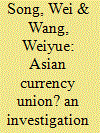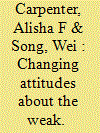|
|
|
Sort Order |
|
|
|
Items / Page
|
|
|
|
|
|
|
| Srl | Item |
| 1 |
ID:
093650


|
|
|
|
|
| Publication |
2009.
|
| Summary/Abstract |
This paper applies Optimum Currency Area (OCA) theory to investigate the suitability of Asian currency union and its membership, in which China is taken as the central country. Cluster analysis is applied for this study. Both hierarchical clustering and fuzzy clustering approaches are used. The study finds that Japan, Korea, Hong Kong, Malaysia, Philippines, Singapore, Thailand, Cambodia and Vietnam are most converged with China, and these countries are more likely to be the member countries of the Asian Currency Union.
|
|
|
|
|
|
|
|
|
|
|
|
|
|
|
|
| 2 |
ID:
146636


|
|
|
|
|
| Summary/Abstract |
The foundation of current legal protection for animals in China is based on the principle of “rational utilization.” This utilitarian attitude supports the exploitation of animals through the legal means of resource management. However, through a process of public education and the construction of recent legislation, attitudes toward animals are rapidly changing in China. After the introduction of the concept of animal welfare in China in 1989, preliminary socioeconomic events such as early laboratory animal science, animal cruelty reports, pet ownership, engagement in international trade, and the severe acute respiratory syndrom (SARS) epidemic helped spur a trend away from a purely utilitarian attitude toward more positive associations with animals among members of the Chinese public. This phenomenon will be analyzed through the actions of non-governmental organizations, the media, academia, and international business to influence education and the development of legislation to promote animal protection practices. In addition, recent events will be used to illustrate political realities in China that impede the full promotion of animal welfare protection.
|
|
|
|
|
|
|
|
|
|
|
|
|
|
|
|
|
|
|
|
|